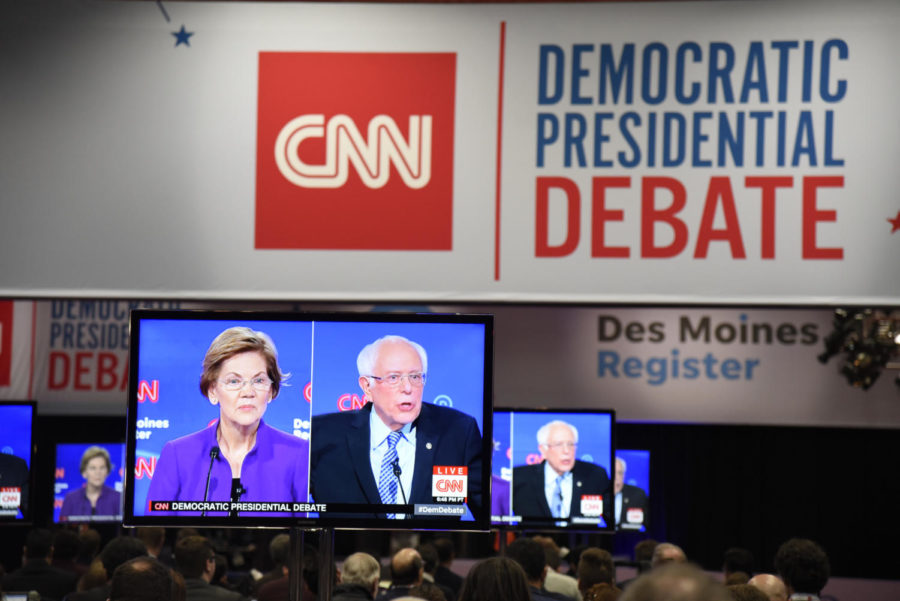Bernie Sanders under fire in latest Democratic debate
February 25, 2020
Seven Democratic candidates took the stage in South Carolina for one last debate before Super Tuesday.
This was the last debate for candidates to plead their case to voters before voting in Saturday’s South Carolina primary and Super Tuesday begins.
Super Tuesday is the biggest day on the presidential primary calendar with 14 states voting in one day.
Super Tuesday has become important to candidates after tonight, since about 30 to 40 percent of convention delegates come from voting Tuesday, said Mack Shelley, Iowa State professor and chair of the political science department.
The candidates that qualified for the debate were Sen. Bernie Sanders, former Vice President Joe Biden, Sen. Elizabeth Warren, former Mayor Pete Buttigieg, Sen. Amy Klobuchar, Tom Steyer and former Mayor Mike Bloomberg.
Questions ranged from the economy, gun violence, candidate’s ability to beat Trump, education, public health, marijuana possession, coronavirus and foreign policy.
“The debate was too chaotic and nasty, an undisciplined shouting match,” said Steffen Schmidt, professor of political science. “The loudest yellers controlled the night.”
Frontrunner Sanders was under fire throughout the night from all of the other candidates.
“I mean, look, if you think the last four years has been chaotic, divisive, toxic, exhausting, imagine spending the better part of 2020 with Bernie Sanders versus Donald Trump,” Buttigieg said.
Klobuchar called Sanders out for being a “socialist.”
“I am the only one who in the New Hampshire debate when asked if we had a problem with a socialist leading the ticket that raised my hands,” Klobuchar said.
Shelley said Klobuchar used calling Sanders out as a tactic to gain support from moderate voters.
Following the last debate, Bloomberg continued to draw attacks from the other candidates.
Bloomberg apologized again for his “Stop and Frisk” policy and spoke on his actions to better the community for all ethnicities.
Warren brought up Bloomberg’s past treatment of women.
“I don’t care how much money Mayor Bloomberg has, the core of the Democratic Party will never trust him,” Warren said. “He has not earned their trust. I will.”
Schmidt said Warren was “too harsh and angry” towards Bloomberg.
“[Bloomberg] did much better than in the last debate,” Schmidt said. “He gave specific examples of what he had done on many different issues as mayor.”
Sanders was asked about his plan to pay for his plans, specifically “Medicare for All.”
When asked to do the math Sanders responded by asking the moderator “[h]ow long do you have?”
Klobuchar accused Sanders of “broken promises that sound good on bumper stickers.”
Candidates were asked about their ability to stop passing a law against gun violence.
Biden called Sanders out for his past votes against gun violence.
“A hundred and fifty million people have been killed since 2007 when Bernie voted to exempt the gun manufacturers from liability,” Biden said. “More than all the wars, including Vietnam, from that point on.”
It is unclear whether Biden misspoke, though far fewer than 150 million people have been killed by guns since 2007. In 2017 in the United States, 39,773 people died from gun-related injuries, according to the Centers for Disease Control and Prevention. That figure is similar to other years since 2007.
Sanders acknowledged that vote and apologized.
“I’ve cast thousands of votes,” Sanders said. “That was a bad vote.”
Sanders has not been “consistent” with gun control, Shelley said.
Although a clear winner was hard to determine, Warren did quite well and had an impressive tendency to avoid lecture talk, Shelley said.
The debate took place in Charleston, South Carolina, just days before that state will have its Democratic primary, the last of the February early voting states.
“Candidates will need momentum coming out of South Carolina to succeed,” Shelley said.







